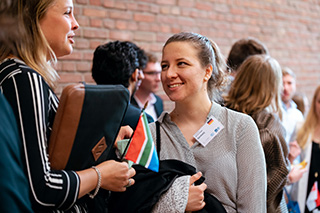The ‘Millennial’ generation believes that the future of the planet rests in their hands, according to a survey of recent master’s graduates in 40 countries.
The international survey conducted by CEMS, the Global Alliance in Management Education, of which University of Cologne is an academic member, found that 80% - most in their mid to late twenties - believe the responsibility will lie with their generation to find the solution to climate change.
Of the 333 survey respondents, many of whom will go on to become business leaders and entrepreneurs, more than half (51%) were confident that humans will find a solution to the problem, while 49% were not confident, reflecting the global air of uncertainty.
"In recent months, young people, pupils and students, not least in the "Fridays for Future" movement, have loudly raised their voices against the climate crisis. The young people do not want to maintain the status quo, but are committed to active change and are willing to take genuine responsibility to keep our planet worth living on. We strongly support all constructive efforts in this direction," emphasizes Marc Fischer, Academic Director & Professor at the University of Cologne, in view of the survey results.
Professor Greg Whitwell, Chair of the CEMS Global Alliance and Dean of the University of Sydney Business School, also comments: graduates clearly “understand that climate change is not just an environmental concern.”
“They know that businesses and governments need to work together for the survival of the planet,” Professor Whitwell said. “They believe that their generation will be required to be the change-makers and do not take this responsibility lightly.”
CEMS is an alliance of 32 of the world’s leading business schools, 70 corporate partners and 7 NGOs, which deliver the CEMS Master’s in International Management (MIM). The CEMS programme is offered as part of the Master of Science International Management at the University of Cologne. Regarding the current Financial Times Masters in Management Ranking 2019 it is the best international management education in Germany.
“Through CEMS we are dedicated to preparing future leaders who are equipped with not only the passion and knowledge needed to tackle climate change, but also the skills required to transform organisations from the inside out,” Professor Whitwell said.
“Across the globe we see our graduates carrying their commitment to the environment and sustainability from the classroom into the business world, as transformative leaders and entrepreneurs.”
“It is crucial that businesses and governments act on the ambition of these young people if they hope to secure the future of the planet,” Professor Whitwell said. “Who better than the future generation of leaders with their energizing can-do attitude to convert such enormous challenges into solutions?”
Commitment to climate action
An example of CEMS graduates’ commitment to climate action, Plan A was found 2017 by Lubomila Jordanova a CEMS graduate from the London School of Economics.
Plan A is a data-driven platform that uses artificial intelligence to pinpoint areas on the planet that are most vulnerable to climate change and a software which helps businesses monitor, offset and reduce their carbon footprint.
Commenting on the survey findings, Lubomila said that, "the climate change crisis is the result of a history of disregard to the planet and exhaustion of its resources”.
“Now our generation face nature's response to this behaviour and can only address the crisis effectively through a collaborative approach, which gets businesses, individuals, scientists, NGOs and governments working together,” Lubomila said.
Tackling climate change through global business education
The CEMS Business and the Environment faculty group, open to all member schools, was founded in the mid-90s with the aim of researching and teaching the managerial implications of the relationship between business and the natural environment.
Members are grounded in a broad variety of disciplinary fields (including management and economics, chemistry, biology, mathematics), which has allowed them to develop and implement new way to introduce environmental issues into mainstream business education.
Out of this faculty group has emerged innovative initiatives such as the Model UNFCCC simulation, the culmination of a semester long programme on climate policy which takes place at CEMS schools across Europe. Now in its 11th year, 180 MIM from 30 nationalities came together in Cologne in May for the 2019 simulation.
During the event students are assigned roles which mirror those participating in the actual negotiations and work to obtain a consensus around ambitious strategies to implement the global objective of maintaining climate change below 2 degrees.
• Further information about the CEMS Master International Management at the WiSo Faculty
